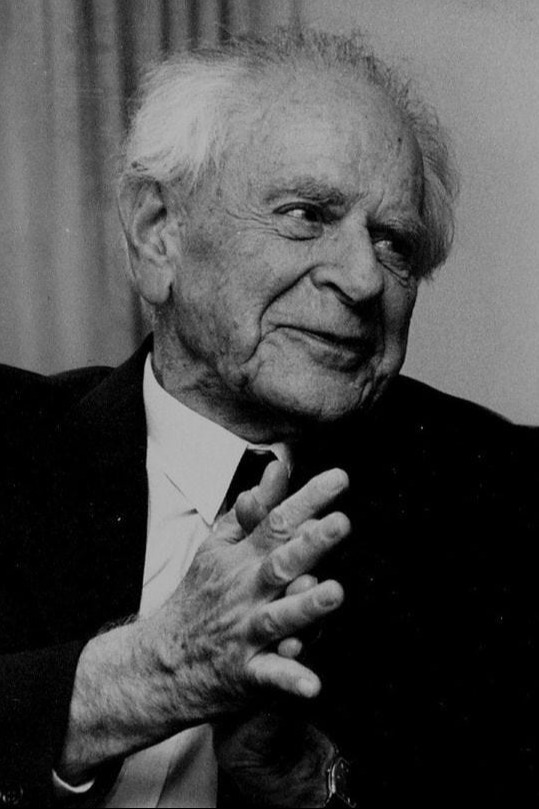
Personal info
Known for
Ultimate Talent
Gender
Male
Birthday
28 July
Location
Vienna, Austria
Edit pageKarl Popper
Biography
Karl Popper (1902–1994) was an Austrian-born British philosopher widely regarded as one of the most influential thinkers of the 20th century, particularly in the philosophy of science. His work on the nature of scientific inquiry, the demarcation problem, and critical rationalism revolutionized how we understand knowledge, scientific progress, and the role of theories in the natural and social sciences.
Early Life and Background
Popper was born in Vienna, Austria, and began his academic career in the social sciences and the philosophy of science. Initially trained in mathematics and physics, his early intellectual development was shaped by the turbulent political climate of Europe between the two World Wars. Popper's exposure to the growing influence of totalitarianism, especially in Nazi Germany and Soviet Russia, led him to question the epistemological assumptions of the dominant scientific paradigms of his time, particularly those that claimed to offer objective, unchallengeable knowledge.
The Philosophy of Science: Falsifiability
Popper is best known for his theory of falsifiability as the criterion that distinguishes scientific theories from non-scientific ones. In his famous work The Logic of Scientific Discovery (1934), Popper argued that the demarcation problem—the question of what makes a theory "scientific"—could be solved not by verifying theories, but by falsifying them. According to Popper, a scientific theory should make testable predictions that can be potentially refuted by empirical evidence. This stands in contrast to theories that are so flexible or vague that they cannot be tested or falsified.
In other words, for Popper, a theory is scientific if it can, in principle, be proven wrong through observation or experiment. He argued that verification, the process of confirming a theory through evidence, is not a reliable method of distinguishing scientific theories from pseudoscience. Instead, falsification—subjecting theories to rigorous tests that could potentially show them to be false—was the true hallmark of scientific progress. For Popper, this provisional nature of scientific knowledge was crucial. Scientific knowledge, he believed, advances not by accumulating absolute truths, but by eliminating falsehoods and refining hypotheses through critical testing.
Popper's famous example of a falsifiable scientific theory was Einstein's theory of relativity, which made predictions about the bending of light by gravity. If experiments had disproven these predictions, the theory would have been falsified. On the other hand, theories like Freud’s psychoanalysis or Marxist theory were, in Popper's view, non-scientific because they could accommodate any outcome and could not be definitively disproven.
Critical Rationalism
Popper developed his broader philosophical approach under the banner of critical rationalism, which emphasizes the importance of critical inquiry and the openness to falsification in all domains of knowledge, not just science. Critical rationalism rejects the idea that knowledge can be obtained through induction—generalizing from observed facts—or by accepting claims without questioning them. Instead, Popper argued that knowledge progresses through a process of conjecture and refutation.
In this framework, scientific theories and hypotheses are conjectures—bold, speculative guesses about how the world works. They are put forward tentatively and tested through experimentation and observation. If the theory fails the test (i.e., is falsified), it is rejected or revised, and the process continues with new conjectures. This cyclical process leads to the gradual approximation of truth, although Popper was clear that absolute certainty is never attainable.
Critical rationalism also emphasizes the importance of open debate and intellectual freedom, as only through the free exchange of ideas and rigorous criticism can any progress be made in both science and society. Popper was a strong advocate of liberal democracy, and his philosophical stance was deeply influenced by his opposition to both totalitarianism and dogmatism.
The Open Society and Its Enemies
In addition to his contributions to the philosophy of science, Popper is well-known for his work in political philosophy, particularly his defense of liberal democracy and critique of totalitarian ideologies. His most influential political work, The Open Society and Its Enemies (1945), argues that societies should be open, allowing for freedom of expression, criticism, and the peaceful resolution of political conflict. Popper was particularly critical of Plato, Hegel, and Marx, whom he viewed as proponents of totalitarian ideas that suppressed individual freedoms and justified authoritarian rule.
Popper’s criticism of historical determinism is central to his political philosophy. In The Open Society, he argues that historical laws—which suggest that history follows a predetermined course—are dangerous because they can be used to justify political regimes that claim to know the “inevitable” course of history, thereby denying people the freedom to shape their future.
Popper’s Legacy and Influence
Popper’s ideas have had a lasting impact on multiple fields, including philosophy, science, politics, and education. His ideas on falsifiability and the scientific method have been foundational in the philosophy of science and have influenced the development of empiricism, positivism, and critical theory. His critique of totalitarianism and defense of an open society were deeply influential during the Cold War and continue to resonate with discussions on democracy, freedom, and human rights today.
Moreover, Popper's emphasis on the provisional and fallible nature of scientific knowledge has continued to influence contemporary debates in the philosophy of science, particularly around issues like scientific realism and the problem of induction.
Conclusion
Karl Popper’s contributions to philosophy, particularly in the philosophy of science, continue to be influential. By arguing that science progresses through falsification, and that knowledge is always provisional and open to revision, Popper helped reshape how we understand the scientific method and human knowledge more generally. His defense of liberal democracy and open societies also set him apart as a leading intellectual voice in the 20th century. His work remains foundational in debates about the nature of science, truth, knowledge, and the role of critical thinking in society.